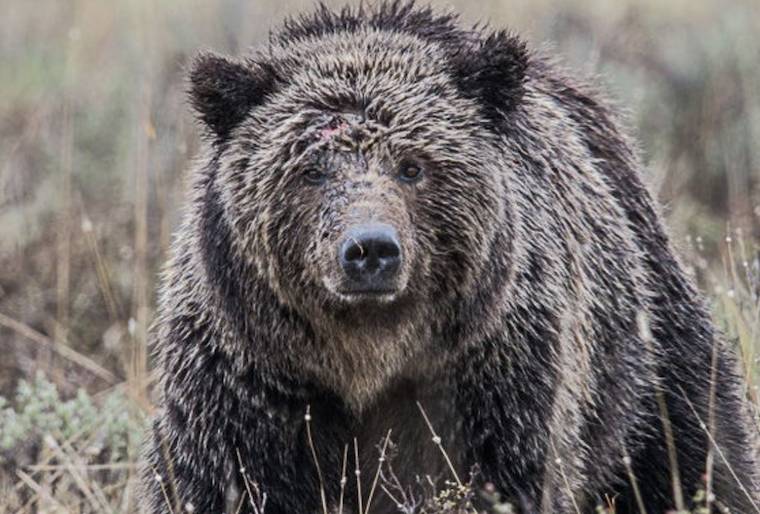
Tribes fight trophy hunters to protect sacred grizzlies
An Animal Rights Article from All-Creatures.org
FROM
Patricia Randolph's Madravenspeak,
Wisconsin Wildlife
Ethic - Vote Our Wildlife /
The Cap Times
June 2018
The delisting of the grizzly bears around Yellowstone National Park plays out a tragedy that the Indian tribes know well.

Grizzly Bear - National Park Service/Angela Bohlke
“Those that massacred our people … they wiped out the buffalo, the
grizzlies and the wolves — and today that mindset is still there, that
‘disease of the mind.’"
~ Chief Arvol Looking Horse, GOAL Tribal Coalition to
Protect the Grizzly
The delisting of the grizzly bears around Yellowstone National Park
plays out a tragedy that the Indian tribes know well. David E. Stannard
argues in his new book, "American Holocaust," that the European and white
American destruction of the native peoples of the Americas was the most
massive act of genocide in the history of the world.
Today we have the ongoing massacre of animals in slaughterhouses and the
hunting and trapping of the last of Earth's wildlife.
The agencies charged with protecting our so-called commons, like those
supposedly protecting water, air, land and democracy, have long been turned
upside down to do the opposite. It is all about money and entrenched power
and take.
Citizens have never been able to trust state and federal wildlife management
agencies, which are funded largely by licenses and fees related to killing
wildlife. Citizen activists for wildlife have been pushing against the
existing killing businesses for decades, but now the crisis is mass
extinction. The 4 percent of mammals left on Earth that are wild need our
protection.
The Grizzly Times, in its “The Government Art of Spin” section, reports:
“The public has been swamped with misinformation about the growth of the
Yellowstone grizzly bear population during the last decade… Bottom line: The
population has not increased since around 2002 and has probably declined
since 2007, which benchmarks the end of the interval during which we lost
most of the cone-producing white-bark pine trees in the Yellowstone
ecosystem…. grizzly bear conflicts with hunters and livestock producers over
meat have surged dramatically since loss of white-bark pine, which is
consistent with a turn by many bears to eating more meat in compensation for
loss of pine seeds...and cutthroat trout.”
The Times charts a dramatic increase of hunter-caused mortality (poaching):
“Note that the increase in hunter-caused mortalities has occurred despite
substantial declines in numbers of hunters afield. This belies claims by
agency spokespeople that hunters are ‘behaving better’ than in the past.”
According to a National Parks Conservation Association press release
fighting to protect the bears, “Visitors to Grand Teton and Yellowstone
National Parks — many of whom travel to the national parks to see wildlife
including grizzly bears — generated more than $1 billion ($1,089,000,000) in
economic spending in 2017 and supported 16,040 jobs, based on a new economic
report released this week by the Department of Interior.”
In 2016, Oglala Sioux Tribe Vice President Tom Poor called for a
congressional investigation into the conduct of the U.S. Fish and Wildlife
Service in its effort to remove the Yellowstone grizzly bear from Endangered
Species protection. It was revealed that USFWS contracted with a former
Halliburton executive heading a multinational oil and gas services group for
peer review of its delisting rule. Also, the article in Native News Online
reports: “Central to Poor Bear’s original complaint are ties between a USFWS
grizzly delisting official and trophy hunting juggernaut, Safari Club
International.”
Native Americans care about the great bear. In 2016, they issued a document
of intertribal solidarity, only the third of its kind in 150 years. The
Grizzly Treaty has been signed by more than 270 tribes, as well as numerous
traditional societies and leaders (representing over 700 tribal nations).
The tribes asked for:
- Consultation with all impacted tribes: A conclusion supported by the U.N. Special Rapporteur on the Rights of Indigenous Peoples.
- Science: “We have serious concerns about the science being presented, and worry that ultimately this process will result in ostensibly zoo populations in two national parks, Yellowstone and Glacier.’”
- Moratorium on killing grizzly bears just delisted.
- Reintroduction, not trophy killing. “There are Tribal Nations with biologically suitable habitat in the grizzly’s historic range who propose having this sacred being reintroduced to their sovereign lands. Instead of trophy hunting them, transplant the hunting quota from Greater Yellowstone and from the Crown of the Continent, to these tribal lands. This reintroduction can provide for economic and vocational opportunity where it is most desperately needed — on our reservations — where unemployment can run from 70 to 90%.”
This includes ecotourism benefits to the tribes and all citizens of this country.
"We now face unprecedented times, the likes of which we have not
encountered in our lifetimes, but that our ancestors confronted and left us
with the examples to follow. This treaty between our nations is not just
about the preservation of this sacred being, the grizzly bear, or the
protection of one river, this is a struggle for the very spirit of the land
— a struggle for the soul of all we have ever been — or will ever become.
Within this struggle to protect the grizzly, and thus the land the grizzly,
in turn, protects with the water, we find many of our struggles…”
~ Chief
Stanley Grier, Chief of the Piikani, Nation of the Blackfoot Confederacy.
Return to Animal Rights Articles







